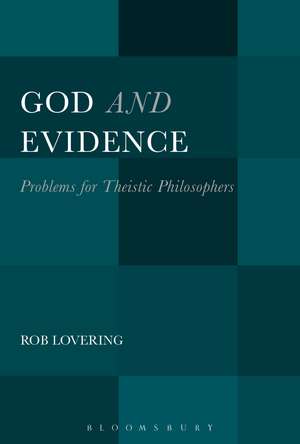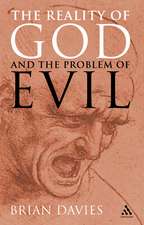God and Evidence: Problems for Theistic Philosophers
Autor Dr. Rob Loveringen Limba Engleză Paperback – 17 dec 2014
| Toate formatele și edițiile | Preț | Express |
|---|---|---|
| Paperback (1) | 254.46 lei 6-8 săpt. | |
| Bloomsbury Publishing – 17 dec 2014 | 254.46 lei 6-8 săpt. | |
| Hardback (1) | 653.61 lei 6-8 săpt. | |
| Bloomsbury Publishing – 14 aug 2013 | 653.61 lei 6-8 săpt. |
Preț: 254.46 lei
Preț vechi: 329.60 lei
-23% Nou
Puncte Express: 382
Preț estimativ în valută:
48.70€ • 50.45$ • 40.64£
48.70€ • 50.45$ • 40.64£
Carte tipărită la comandă
Livrare economică 21 martie-04 aprilie
Preluare comenzi: 021 569.72.76
Specificații
ISBN-13: 9781628928075
ISBN-10: 1628928077
Pagini: 152
Dimensiuni: 152 x 229 x 8 mm
Greutate: 0.21 kg
Editura: Bloomsbury Publishing
Colecția Bloomsbury Academic
Locul publicării:New York, United States
ISBN-10: 1628928077
Pagini: 152
Dimensiuni: 152 x 229 x 8 mm
Greutate: 0.21 kg
Editura: Bloomsbury Publishing
Colecția Bloomsbury Academic
Locul publicării:New York, United States
Caracteristici
Ties in to the resurgent analytic philosophical tradition of exploring evidence for God
Notă biografică
Rob Lovering is Assistant Professor of Philosophy in the Department of Political Science, Economics, and Philosophy at the College of Staten Island/City University of New York, USA
Cuprins
1. Introduction / 2. A Problem for Theistic Inferentialists / 3. A Problem for Theistic Non-Inferentialists / 4. A Problem for Theistic Fideists / 5. A Problem for All Three Theistic Philosophers / 6. Another Problem for All Three Theistic Philosophers 7. Epilogue / Bibliography / Index
Recenzii
Given the wide range of current objections to a belief in God, this is an ambitious project - but it is one which [Lovering] successfully fulfils. In a discussion which is throughout admirably clear, accessible, persuasive, careful and well-informed, he is scrupulously fair to his opponents... This is an impressive addition to the current body of pro-atheist philosophical argumentation.
Lovering's book is a welcome addition to the literature. His arguments are novel and forceful... While Lovering's arguments might not conclusively refute the theistic views he considers, they do show that these positions will be incredibly difficult to defend. And that is no small achievement.
God and Evidence is wonderfully concise and describes the options open to defenders and opponents of theism at various junctures at an effective and exciting pace... Lovering exposes some evasive maneuvers popular among advocates of theism as inadequate by showing the unacceptability of their wider deleterious effects on our knowledge of God.
[A] very good introduction to the problems that theists have to face in understanding the relationship of their theism to evidence: the problems are nicely set up; the questions Lovering poses are the right ones to pose; the criticisms he levels against the variety of answers he considers are cogent even if due to the breadth of coverage he is aiming for they are seldom conclusive. Like all good books, then, it gets one thinking.
Lovering's book is a welcome addition to the literature. His arguments are novel and forceful... While Lovering's arguments might not conclusively refute the theistic views he considers, they do show that these positions will be incredibly difficult to defend. And that is no small achievement.
God and Evidence is wonderfully concise and describes the options open to defenders and opponents of theism at various junctures at an effective and exciting pace... Lovering exposes some evasive maneuvers popular among advocates of theism as inadequate by showing the unacceptability of their wider deleterious effects on our knowledge of God.
[A] very good introduction to the problems that theists have to face in understanding the relationship of their theism to evidence: the problems are nicely set up; the questions Lovering poses are the right ones to pose; the criticisms he levels against the variety of answers he considers are cogent even if due to the breadth of coverage he is aiming for they are seldom conclusive. Like all good books, then, it gets one thinking.



















